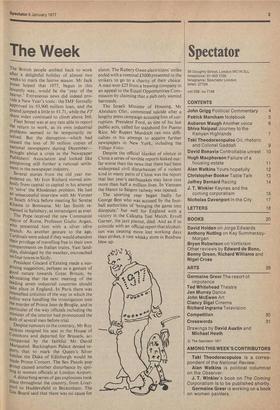The Week
The British people ambled back to work after a delightful holiday of almost two weeks to mark the festive season. Mr Jack Jones hoped that 1977, begun in this leisurely way, would be the year of the beaver.' Extraneous news did indeed provide a New Year's tonic: the IMF formally approved its S3,900 million loan, and the Pound jumped a little to 81.71, while the FT Share index continued to climb above 360.
Fleet Street was at any rate able to report the return to work, as its own industrial Problems seemed to be temporarily resolved. But the disruption—which had caused the loss of 30 million copies of national newspapers during December— brought about a crisis in the Newspaper Publishers Association and looked like Postponing still further a rational settlement in the newspaper industry.
Several stories from the old year meandered on. Mr Ivor Richard moved aimlessly from capital to capital in his attempt to 'solve' the Rhodesian problem. He had an unsuccessful interview with Mr Vorster in South Africa before meeting Sir Seretse Khama in Botswana. Mr Ian Smith remained in Salisbury, as intransigent as ever.
The Pope received the new Communist Mayor of Rome, Professor Giulio Argan, Who presented him with a silver olive branch. As another gesture to the age, Cardinals were asked if they would abandon their privilege of travelling free in their own compartments on Italian trains. Vast landslips, dislodged by the weather, encroached °II four towns in Sicily.
President Giscard d'Estaing made a surPrising suggestion, perhaps as a gesture of good nature towards Great Britain, by advocating that the next meeting of the leading seven industrial countries should take place in England. In Paris there was intensified criticism of the way in which the Police were handling the investigation into the Murder of Prince Jean de Broglie, and in Particular of the way officials including the minister of the interior had pronounced the guilt of several men before trial.
Despite rumours to the contrary, Mr Roy Jenkins resigned his seat in the House of Commons and departed for Brussels, accompanied by the faithful Mr David Marquand. Buckingham Palace denied rePorts that to mark the Queen's Silver Jubilee the Duke of Edinburgh would be Made Prince Consort. The Sex Pistols pop group caused another disturbance by spitting at women officials at London Airport.
A disturbing series of gas explosions took Place throughout the country, from Liverpool to Huddersfield to Beckenham. The as Board said that there was no cause for alarm. The Rubery Owen electricians' strike ended with a nominal £5000 presented to the strikers to go to a charity of their choice. A man won £25 from a brewing company in an appeal to the Equal Opportunities Commission by claiming that a pub only wanted barmaids.
The Israeli Minister of Housing, Mr Abraham Ofer, committed suicide after a lengthy press campaign accusing him of corruption. President Ford, as one of his last public acts, called for statehood for Puerto Rico. Mr Rupert Murdoch ran into difficulties in his attempt to acquire further newspapers in New York, including the Village Voice.
Despite the official blanket of silence in China a series of terrible reports leaked out : far worse than the news that there had been widespread civil disturbances of a violent kind in many parts of China was the report that last year's earthquakes may have cost more than half a million lives. In Vietnam the Hanoi to Saigon railway was opened.
The sporting year began badly for George Best who was accused by the football authorities of 'bringing the game into disrepute,' but well for England with a victory in the Calcutta Test Match. Erroll Garner, the jazz pianist, died. And as if to coincide with an official report that alcoholism was causing more lost working days than strikes, a vast whisky store in Renfrew


































 Previous page
Previous page